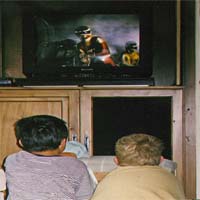We tune in to the news whenever tragedy strikes, many of us keeping CNN on in the background as we go about our daily routines. We watch and listen for developments, and as the BP oil spill continues to devastate along the Gulf Coast, many of us can’t look away. It is our hope that keeps us tuning in, and though we may not think about it while we watch, our kids are watching too.
Many of us may not know the answers to the questions our kids ask, but in order to make sure we don’t terrify and depress them, experts say we need to choose our answers carefully.
A lot of kids are worried about how this oil spill is going to affect the animals along the Gulf Coast. Yours may be asking questions about what will happen to birds covered in oil, the fish and mammals that live in the water and possibly even the workers trying to clean up and get the oil spill under control.
Taking the time to educate yourself about what is going on gives you the upper hand when your kids start asking questions, allowing you to formulate answers that are easy for them to understand. Going too deep into the issue may confuse your child, so setting up a platform for discussion and fielding their questions is one of the best approaches.
Vancouver-based parenting speaker, Kathy Lynn said, “Sometimes we start talking to kids before we know what it is we are going to say, so it’s a good idea to be very clear where you sit on this issue and then present that to your children in whatever language is appropriate for the age of the child.”
 Lynn also noted we shouldn’t go beyond the questions our children ask, as it may become confusing for them to process so much information. “…[D]ole it out in small pieces and give them the basic simple answer first. If that satisfies them, then be quiet.”
Lynn also noted we shouldn’t go beyond the questions our children ask, as it may become confusing for them to process so much information. “…[D]ole it out in small pieces and give them the basic simple answer first. If that satisfies them, then be quiet.”
Assuaging their fears is your top priority as a parent, so make sure you are prepared to answer questions. Remember not to give them too much information, and leave yourself open to discussion if they keep asking questions.
Knowledge is power, or so they say, and sharing your knowledge in ways your kids can understand may keep their fears at bay, and get them interested in current affairs. It is also a great way to get them involved in protecting the planet and the environment. So don’t be afraid to talk to your kids, just make sure you approach it from an age-specific standpoint they can understand.
